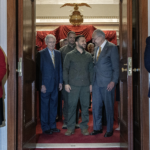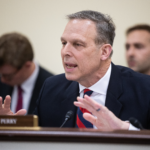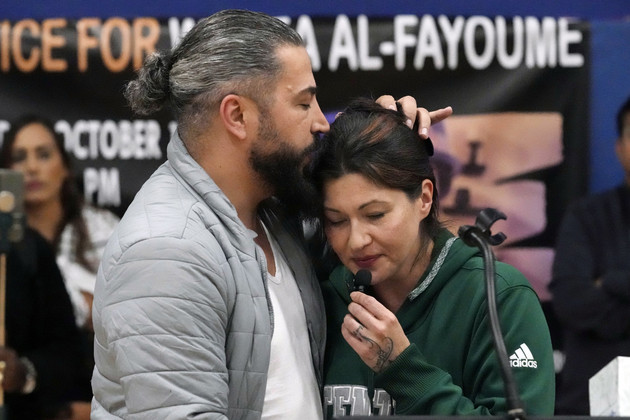“It gave the impression that it’s okay to do that to Palestinians because they’re Palestinians,” she said on the call. “That’s dehumanizing, and it opens the door for people to think that, well, you know, certain things are okay because they must be bad people. They must be terrorists.”
Also on the call, Warren David, president of Arab America, told Andrew Miller, the deputy assistant secretary of state for Israeli-Palestinian affairs, that his members were “outraged — outraged — to say the least at the rhetoric that’s been coming out the last few days” from the Biden administration.
David warned of “the demonization of Palestinians in Gaza and of Arabs in general” that “has really escalated hatred” against them. And he asked Miller what the State Department and President Joe Biden planned to do to “walk back their negative discourse” in light of the slaying of Wadea Al-Fayoume.
“We feel great damage has been done regarding the image of Arabs in the United States,” David said on the call. “In some ways, it’s worse than what happened in 9/11.”
In response, Miller stressed that the Biden administration’s “intent has certainly not been to stoke anti-Arab sentiment” and welcomed further discussion to “make sure that we’re not unintentionally contributing to a problem.” He also said that “the Palestinian people are not to blame for Hamas’ actions” and that the administration takes the safety of minority groups “very, very seriously.”
Nevertheless, the discussion put in stark relief the degree to which Arab Americans and Muslims throughout the country are fearful of becoming victims of a 9/11-style backlash after Hamas’ rampage. It also underscored the growing frustrations they’ve felt with the administration’s posture, even as the president’s tone has evolved.
Those frustrations as well as the unease voiced on the call may only grow in significance as the conflict in Israel escalates. As Biden prepared to travel to Israel this week, a blast at a hospital in Gaza that reportedly claimed hundreds of lives and intensified international alarm about civilian casualties. Israel and Hamas leveled conflicting accusations of responsibility for the explosion.
In the immediate aftermath of the Palestinian militant group Hamas’ killing of more than 1,000 Israeli civilians and soldiers in a surprise raid this month, Biden offered unequivocal support for Israel. He said Hamas’ attack was “pure, unadulterated evil” and vowed that the United States “has Israel’s back.” In recent days, Biden has expressed concern for Palestinian civilians and Secretary of State Antony Blinken has announced that the U.S. and Israel agreed to put together a plan to get humanitarian aid into Gaza.
On Sunday, U.S. national security adviser Jake Sullivan said it is “critical” that Palestinian civilians have places where they can go “that will not be subject to military bombardment” and “have access to the the essentials: to food, water, medicine, shelter.”
Roughly 3,000 Palestinians have been killed in Gaza since the Israel-Hamas war began, according to Palestinian officials. The death toll in Israel has risen to 1,400, according to Israeli authorities.
“We can’t lose sight of the fact that the overwhelming majority of Palestinians had nothing to do with Hamas and Hamas’s appalling attacks, and they’re suffering as a result as well,” Biden declared at an infrastructure announcement in Philadelphia last week.
He made similar remarks at a Human Rights Campaign dinner this weekend, decrying “a humanitarian crisis in Gaza.” And after Al-Fayoume’s killing, Biden said he was “shocked and sickened” by the news. “This horrific act of hate has no place in America,” he added.
But some Arab American and Muslim leaders, as well as their allies, dismissed Biden’s recent statements as too little, too late. They said in interviews that they have been horrified by the recent remarks of foreign policy hawks such as Sen. Lindsey Graham (R-S.C.), who described the Israel-Hamas war as a “religious war.” But they said they have also been distressed by remarks made by Biden officials and other Democrats with whom they are more often aligned.
Several expressed disappointment in comments made last week by White House press secretary Karine Jean-Pierre, who called progressive lawmakers’ advocacy for a cease-fire “disgraceful,” “wrong” and “repugnant.” They were particularly frustrated given that two of the top liberal politicians advocating for a cease-fire are Reps. Rashida Tlaib (D-Mich.) and Ilhan Omar (D-Minn.). Those members, the first two Muslim women elected to Congress, were among a group of progressive female lawmakers of color who received a security briefing from Capitol Police amid an uptick in threats.
White House officials said that Biden has stood firmly against Islamophobia as well as antisemitism throughout his presidency. They noted that he has repeatedly stated that Hamas does not represent the Palestinian people, directed his top national security officials to meet with Muslim leaders last week, and called on law enforcement officials to identify any potential domestic threats that could emerge in connection with the Israel-Hamas war.
They also pointed to Biden’s efforts and statements aimed at combating anti-Muslim hatred before the war began. At an Eid al-Fitr celebration at the White House last May, he said that fighting Islamophobia was a “priority” for his administration and touted a task force to address attacks on Muslims.
“President Biden and Vice President Harris have been unequivocal: there is no place for hate in America — not against Muslims, not against Arab Americans, not against Jews — not against anyone,” said White House spokesperson Robyn Patterson. “On President Biden’s very first day in office, he rescinded the previous administration’s Muslim ban. He’s gone on to establish the first interagency task force to address attacks on Muslims and anti-Muslim bias and discrimination. President Biden has made clear that standing up against Islamophobia is essential to who we are as a country.”
James Zogby, president of the Arab American Institute and Democratic National Committee member, told POLITICO that he is “deeply concerned” by recent rhetoric by Biden and his aides.
“There was no language of compassion for Palestinians in the initial statements. There was no call for a cease-fire or for restraint,” he said.
Khalil Jahshan, executive director of the Arab Center Washington, D.C., who was on the call Monday, said that in previous discussions with Biden officials last week, Arab American and Muslim leaders “did raise the issue of domestic violence here and the need for the president to open his mouth and say this is not a war against fellow Americans.”
He added that “at least on that one, they delivered.”
After the killing of Al-Fayoume, some Muslim leaders also privately made the case to Biden officials that the president himself should speak directly about the tragedy, according to a person familiar with their conversations.
And he did.
“The child’s Palestinian Muslim family came to America seeking what we all seek — a refuge to live, learn, and pray in peace,” Biden said on Sunday. “As Americans, we must come together and reject Islamophobia and all forms of bigotry and hatred. I have said repeatedly that I will not be silent in the face of hate. We must be unequivocal. There is no place in America for hate against anyone.”
Author Profile
- "Lean Left" Bias Rating
- Politico, known originally as The Politico, is an American, German-owned political journalism newspaper company based in Arlington County, Virginia, that covers politics and policy in the United States and internationally. It primarily distributes content online but also with printed newspapers, radio, and podcasts.
Latest entries
 HeadlinesOctober 19, 2023Obama’s Aid Chief Has Some Surprising Ideas for How to Win Over Republicans
HeadlinesOctober 19, 2023Obama’s Aid Chief Has Some Surprising Ideas for How to Win Over Republicans HeadlinesOctober 18, 2023‘Great damage has been done’: Arab American leaders privately confront Biden administration
HeadlinesOctober 18, 2023‘Great damage has been done’: Arab American leaders privately confront Biden administration HeadlinesJune 13, 2023'Trying to figure it out': McCarthy's conservative rebels struggle with next steps
HeadlinesJune 13, 2023'Trying to figure it out': McCarthy's conservative rebels struggle with next steps HeadlinesJune 11, 2023Autism Advocates Are Dreading a Campaign Season of Insinuations About Ron DeSantis
HeadlinesJune 11, 2023Autism Advocates Are Dreading a Campaign Season of Insinuations About Ron DeSantis

